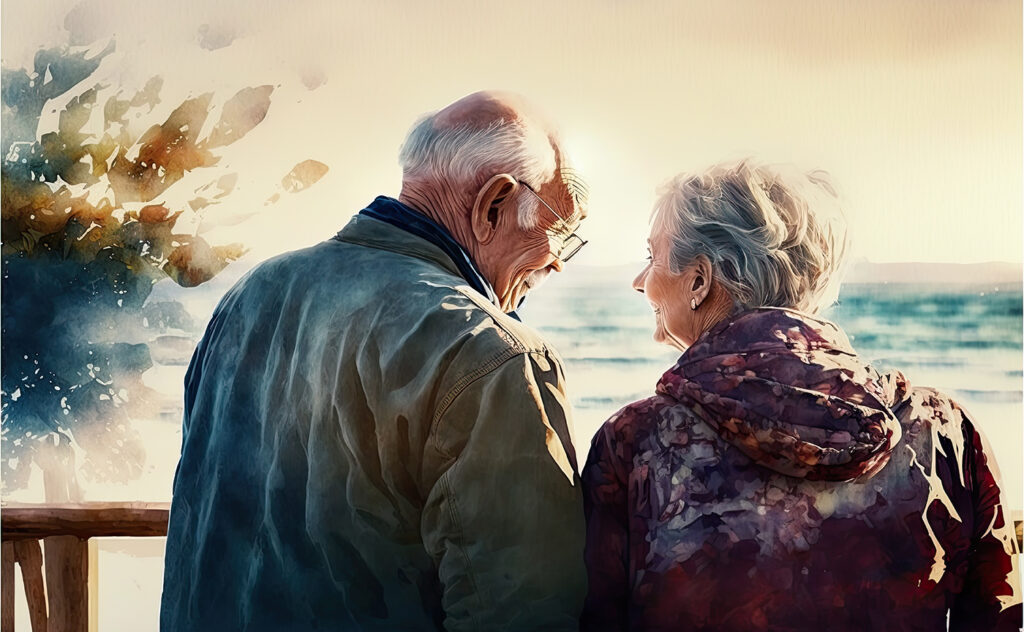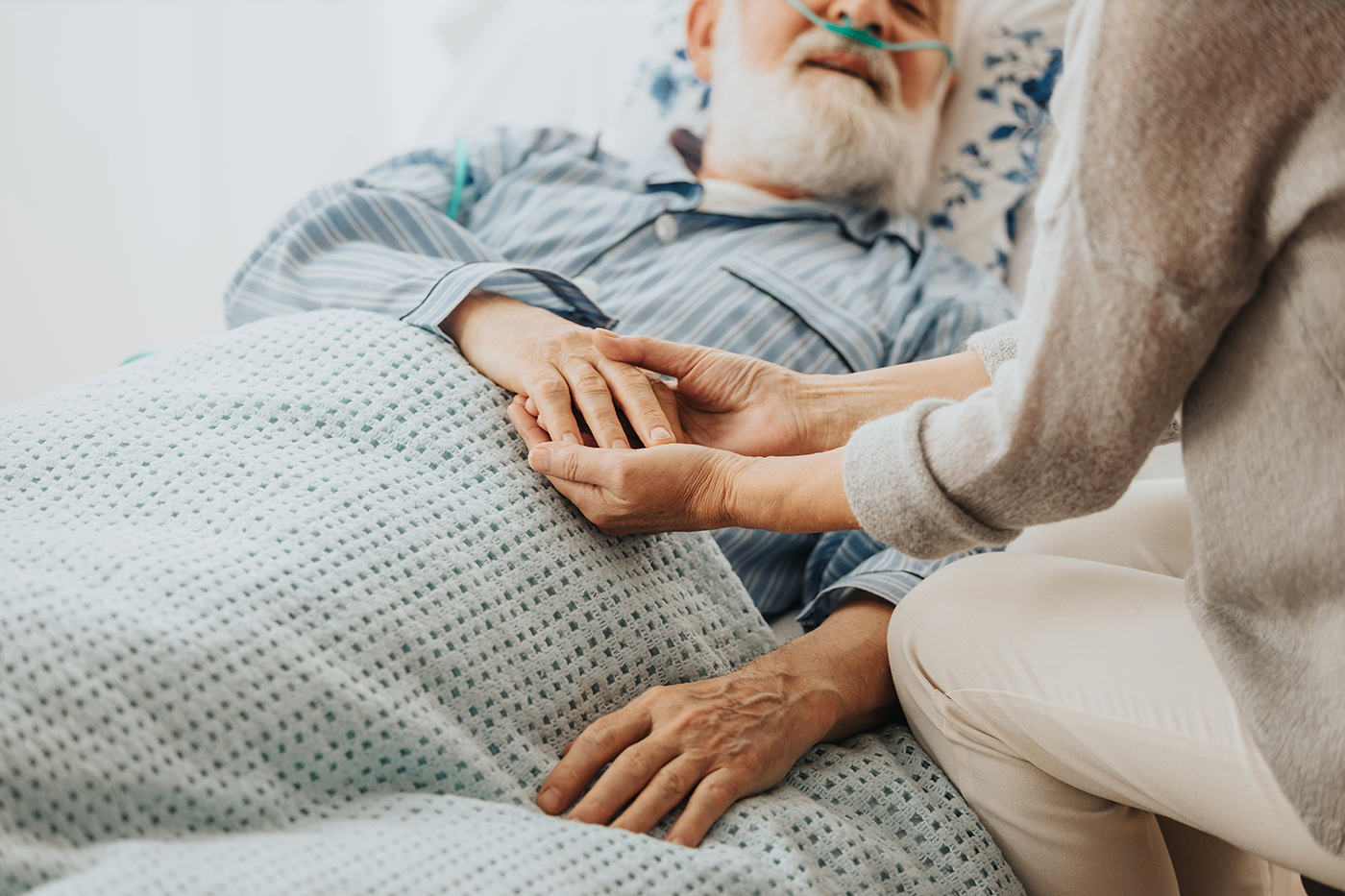How to Know When Someone with Dementia Is Nearing the End

When caring for someone with dementia, you know that, ultimately the day will come when your loved one doesn’t have long to live. Alzheimer’s and other forms of dementia are terminal, incurable diseases. It’s not a matter of if your loved one will die, but when.
But dementia is typically not a quick disease. From the time of diagnosis to death can be anywhere from 2 to 20 years, depending on your loved one’s age, health and quality of life throughout the disease.
And unlike some diseases like cancer that can have a quick and steep decline, the decline for someone with dementia can be more like a staircase. As hospice nurse Julie McFadden explains, typically the decline toward death for someone with dementia begins with a fall or an infection, like a urinary tract infection or aspiration pneumonia. This can cause your loved one to start to decline, but once the infection goes away or your loved one has healed from the fall, he may bounce back, creating a plateau in his health. Then, another infection or progression of the illness comes and causes another decline from which he may bounce back again.
This setback-bounce-back cycle is what causes the staircase of decline for those who are dying of dementia. And this can make it difficult to know when your loved one is dying. Your loved one’s progression toward death could take weeks, months or even years.
Signs your loved one with dementia is dying
If your loved one has been on the staircase of decline for some time, there are some signs to look out for that indicate she might be getting close to death. According to Crossroads Hospice, if your loved one is in her last few months of life, you can expect to see these signs:
These signs indicate your loved one could be entering her last days or weeks:
According to McFadden, death for someone with dementia is typically peaceful. The confusion and agitation caused by the disease often go away in the last few days as your loved one mostly sleeps.
Occasionally, someone with dementia at the end of his life may experience moments of lucidity — a phenomenon that’s been observed months and years before death but is most often recorded in the days leading up to death. These are moments in which your loved one may suddenly remember details once forgotten — who you are, where he is, significant recent events.
These moments, while often a precursor to death, may help researchers better treat dementia and Alzheimer’s. As Andrew Peterson, a researcher of bioethics and consciousness, explains, these bursts of lucidity suggest “there may be neural networks that are remaining, and/or pathways and neural function, that could help potentially restore cognitive abilities to individuals we otherwise think are permanently impaired.”
How to care for your loved one who is dying

Once your loved one is at the end of her life, your job will likely shift. Daily activities like going on walks, running errands or cooking will no longer be possible. Instead, your focus will be on keeping her as comfortable as possible as she becomes less and less mobile. McFadden says your job as a caregiver at the end of life is to keep your loved one “clean, safe and comfortable.” To do this well, you will likely need hospice care.
According to CaringInfo, hospice care “is a type of health care that focuses on the relief of a terminally ill patient’s distress and symptoms and attending to their emotional and spiritual needs during the final stages of life.” If your doctor has given your loved one six months or less to live, he qualifies for hospice care. Hospice care is available 24/7. Hospice healthcare professionals will not treat your loved one’s dementia or underlying conditions. Their sole focus is keeping him safe, clean and comfortable during his final days, weeks or months.
Understanding your options for hospice care before your loved one is in need of it will help smooth the road as you navigate caring for your loved one in her final days. Talk to your doctor and insurance company about what your options are and ideally speak to your loved one while she can still make decisions about her end-of-life care.
Making an end-of-life plan
In addition to hospice, you will want to discuss several other details that come up as your loved one is dying and after she’s passed. While these can be difficult conversations to have while your loved one is still living, they are crucial. Making an end-of-life plan will give your loved one peace of mind that her wishes will be honored. A plan will ensure you know exactly what to do and aren’t left wondering what your loved one would want and worrying you’ll make the wrong decision. Making this plan ahead of time will allow you to focus on spending time with your loved one in her final days rather than making plans and looking through paperwork.
The Alzheimer’s Association recommends having a plan in place for all advance directives, which is any decision that needs to be made at the end of your loved one’s life and after she has passed, including.
At The Breckinridge Memory Care in Lexington, Kentucky, we are no strangers to the end of life. Death is an inevitable part of our caregiving journey. We know that no matter when or how it happens, it is always difficult, but we also know that when families are prepared for this inevitable event, they can enjoy their final moments together so much more than if those moments were spent trying to make stressful and vital decisions
If you are wondering how much longer your loved one has to live or if she has been on the staircase of decline for several months, talk to your doctor. Hospice may be available to you or other medical care options that could help ease your load and help you focus on cherishing your last moments with the one you love.





